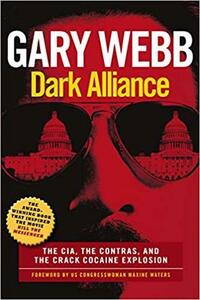Take a photo of a barcode or cover
dark
informative
sad
slow-paced
dark
informative
tense
slow-paced
dark
informative
reflective
sad
slow-paced
packed with evidence; there can be no doubt that the DEA, the CIA, and the state department looked the other way, and even supported and encouraged the Contras as they sold cocaine in the US to fund their war. there is also a straight line of causation between the cocaine sold by the contras in California and the explosion of the national crack market.
extremely detailed and a very illuminating look into the practices of the CIA, the DEA, and the state department.
my biggest complaint is the crappy OCR used by the e book. who is “Norwin Mencses”?
extremely detailed and a very illuminating look into the practices of the CIA, the DEA, and the state department.
my biggest complaint is the crappy OCR used by the e book. who is “Norwin Mencses”?
Whether or not you'll find Dark Alliance interesting is pretty easy to test. Just gauge your reaction to the following paragraph:
From there you pretty much have to ask yourself two questions: do I believe the allegations by Gary Webb? And if so, what does that mean?
To the first question, I'm afraid I have to equivocate a bit. I do not think that Webb could make his case in a court of law. Much of the evidence is circumstantial, and he is too good of a journalist to make assertions in his reporting that he cannot back up with hard evidence.
Having said that, it's difficult for a reasonable person to read his reporting and not support the underlying conclusion. The book is exhaustively researched, to the point where I actually knocked a star off my review. Webb's insistence on showing us every damning dot he has connected actually gets in the way of the story at times, because you lose the underlying thread amidst a wall of names, dates and illicit drug deals.
So one is left with the second question: what does this mean?
I do not believe, as I had originally heard this story described, that the federal government, through the CIA, willfully welcomed cocaine into black neighborhoods in America's inner cities with the intention of destroying the fabric of African-American society.
The truth feels to me, as an observer from my perch of white privilege several decades later, at least as insidious. That is, that in their zeal to overthrow the left-leaning Sandinista government in Nicaragua, federal agents working for the CIA, FBI and DEA knowingly allowed or encouraged the trafficking of large amounts of cocaine to be imported to the U.S. I don't think they could have anticipated the crack explosion, so it's hard to lay that at the feet of the federal government, but their indifference to the effects of their actions and non-actions for the sake of what now seems a trivial cause is startling in its cruelty.
I understand that, realistically, the drug war is a tremendous sham, so trying to lay the destruction wrought by crack cocaine at the government's feet is a little misleading. It's not as though crack never would have happened were it not for the government — it merely seems as though they positioned their people to stand to benefit from the situation, and tried to funnel the largess into a pet project in Central America.
I'm trying not to frown at tacit admissions that the War on Drugs is wrong. BUT.
If one accepts the findings of Webb's reporting, it becomes somewhat difficult to try and maintain a belief in the genuine legitimacy of a government that behaves in the ways described. The natural question becomes: if they can do this, then what haven't they told us about?
One begins to look at the relationship with Afghanistan and their opium production a little differently...
In any case, if you've got a non-conformist bone in your body, this is a book well worth reading. The chapter at the end that describes his reporting process was lovely, and I can't wait to see Kill The Messenger.
For the better part of a decade, a Bay Area drug ring sold tons of cocaine to the Crips and Bloods street gangs of Los Angeles and funneled millions in drug profits to a Latin American guerrilla army run by the U.S. Central Intelligence Agency, a Mercury News investigation has found. This drug network, federal records show, opened the first pipeline between Colombia's cocaine cartels and the black neighborhoods of Los Angeles, a city now known as the crack capital of the world. The cocaine it brought into the United States fueled the crack explosion in urban America, and the simultaneous rise to power of the murderous gangs of black L.A.
From there you pretty much have to ask yourself two questions: do I believe the allegations by Gary Webb? And if so, what does that mean?
To the first question, I'm afraid I have to equivocate a bit. I do not think that Webb could make his case in a court of law. Much of the evidence is circumstantial, and he is too good of a journalist to make assertions in his reporting that he cannot back up with hard evidence.
Having said that, it's difficult for a reasonable person to read his reporting and not support the underlying conclusion. The book is exhaustively researched, to the point where I actually knocked a star off my review. Webb's insistence on showing us every damning dot he has connected actually gets in the way of the story at times, because you lose the underlying thread amidst a wall of names, dates and illicit drug deals.
So one is left with the second question: what does this mean?
I do not believe, as I had originally heard this story described, that the federal government, through the CIA, willfully welcomed cocaine into black neighborhoods in America's inner cities with the intention of destroying the fabric of African-American society.
The truth feels to me, as an observer from my perch of white privilege several decades later, at least as insidious. That is, that in their zeal to overthrow the left-leaning Sandinista government in Nicaragua, federal agents working for the CIA, FBI and DEA knowingly allowed or encouraged the trafficking of large amounts of cocaine to be imported to the U.S. I don't think they could have anticipated the crack explosion, so it's hard to lay that at the feet of the federal government, but their indifference to the effects of their actions and non-actions for the sake of what now seems a trivial cause is startling in its cruelty.
I understand that, realistically, the drug war is a tremendous sham, so trying to lay the destruction wrought by crack cocaine at the government's feet is a little misleading. It's not as though crack never would have happened were it not for the government — it merely seems as though they positioned their people to stand to benefit from the situation, and tried to funnel the largess into a pet project in Central America.
I'm trying not to frown at tacit admissions that the War on Drugs is wrong. BUT.
If one accepts the findings of Webb's reporting, it becomes somewhat difficult to try and maintain a belief in the genuine legitimacy of a government that behaves in the ways described. The natural question becomes: if they can do this, then what haven't they told us about?
One begins to look at the relationship with Afghanistan and their opium production a little differently...
In any case, if you've got a non-conformist bone in your body, this is a book well worth reading. The chapter at the end that describes his reporting process was lovely, and I can't wait to see Kill The Messenger.
challenging
informative
reflective
slow-paced
Interesting, and incredibly (overwhelmingly) detailed and researched. I never finished it though - he kind of made the same point over and over. It's an issue that's worth understanding though, and I'm glad to have learned about it.
Such an incredible story. It’s one of those conspiracies that’s not a theory at all. A real life conspiracy that will fundamentally challenge what you think about our so-called free press, our democratic institutions and our supposed traditions. It’s a story about pure power that simply doesn’t have the time for our collective stories. And Gary Web does a fantastic job of laying it all out for us.
Terrifying, informative, a little wordy the first half because you need to get a grip on all these real life characters, but by the end only three names matter, Ricky Ross, Norwin Menses, and Oliver effing North. Eff all of them for helping the Crack epidemic destory a entire brown and black generation.
you probably get it: cia facilitates latin american coke trafficking and supervises crack cocaine distribution stateside as those profits are funneled to anti-sandinista efforts. Read it and your jaw will still probably drop seeing the lengths the government (doj, dea, cia, lapd) goes to continue this operation and support the contras, or the depraved depths the media stoops to annihilate webb and the story
Gary Webb is an American hero and his Wikipedia article is near libel to cast so much doubt on the journalism that killed him. Dark Alliance so thoroughly documents CIA complicity in the cocaine trade that I was ashamed of myself to recognize I'd swallowed their propaganda. The epilogue chronicling reaction to his article is one of the most staggering single chapters I've ever read. There is a tone of disbelief and of still wanting to believe despite everything. Gary Webb attributed the CIA decision to reckless, criminal stupidity. It was a devastating coincidence that smokeable crack should arise at the same time that relatively harmless cocaine was identified as a strategic commodity. For even more gruesome insight to CIA strategy, check out Politics of Heroin by Alfred McCoy.




